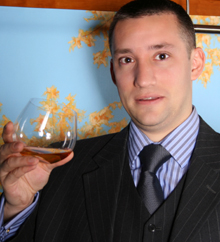By Kurt Maitland
Last week’s news that British drinks giant Diageo would close their Masters of Whisky (MOW) program at the end of September perhaps went unnoticed by drinkers at large, but it was a seismic event among the bartenders, retailers, enthusiasts, journalists and industry professionals who had engaged with the program during its two decade lifespan. Even more shocking for some was the perceived callousness of the announcement, coming as it did just days after the passing of MOW founder Evan Cattanach. His son and current Master of Whisky, Gregor Cattanach, learned while in mourning that he and 23 other Masters would soon be out of a job.
Diageo’s actions regarding its whisky portfolio have provoked much confusion, and sometimes amusement, among observers in recent years. The reaction to the termination of MOW ranged darker, from sadness to outrage, as seen on Twitter, in numerous blogs and articles, and in the following comments made for The Whiskey Reviewer:
Flavien Desoblin, Owner of The Brandy Library and Copper & Oak in NYC
I’d say if there is one way to go right now, it’s with educating the crowds, not just pouring. Entertaining has a new face when it comes to whisky consumption, and it’s “Education.” Which is exactly what the MOW guys were doing. With a great deal of experience, technical knowledge and folk stories in their bags, these guys have painted Scotch with bright colors. Sad to see that go.
Martin Duffy (Former Senior Master of Whisky and Co-Producer of The Chicago Independent Spirits Expo)
Since many of my former colleagues are under orders to remain silent for the unforeseeable future, I have spoken out on their behalf. I was stunned when I first heard the news. I literally stopped to recall if it was April 1st and this was just some gag being played on the public and the industry alike. This program is what started the whole idea of a brand ambassador, a face and name to consumers and the trade, going out into the market place and spreading the gospel of spirits. To drop the program, rather unceremoniously and within days of the passing of Evan Cattanach, the man who started it all, just shows the disconnect that some companies have with the people that they claim to reach out to. Also, the fact that the members of the MOWs, many of whom have moved markets and dedicated large amounts of their time beyond the usual 40 hour work week, were all just let go at once over a conference call, just seems cold. This program was really put together by scratch and was built as it went along starting with just seven Masters of Scotch, many of who had previously worked seven years part-time for Johnnie Walker and The Classic Malts. To tear something down that took nearly 23 years to build, and that was the standard bearer for the industry in regards to how brand ambassadors should be trained and how they should convey not just brand information, but overall spirit education just doesn’t make sense to me.
Joshua Hatton, CEO of the Jewish Whisky Company
My thoughts in a word? Shortsighted.
We’re living in interesting times right now. The economy has been picking up and, when it comes to brown spirits, people are once again splurging on high end vices. In this case, whisk(e)y. What’s more is given the rebound of the economy we live in optimistic times. So, while many who can afford top shelf whisk(e)y are buying said top shelf whisk(e)y, many more who really can not afford such things are still buying and drinking above their pay grade. (I can pay off my credit card, right?)
With a switch from education on whisk(e)y to a focus on the luxury aspect, any efforts to teach about what’s in the bottle, why it’s special, where it comes from, how it’s made, and the stories therein are gone. In its place are nothing more than brands names and people ability to purchase social status.
But, what happens when the economy tanks again? What happens when we go through yet another cycle of stagnation in global whisk(e)y sales? People will no longer remember why they bought those bottles of Scotch or bourbon. They’ll just remember that these bottles are a luxury that they can no longer afford (even if shelf pricing drops).
How many distilleries will close then? How many jobs will we lose? What brands will we lose forever? How many Rosebanks and Port Ellens will we say goodbye to this time around? The Diageo team behind this move seem to have read some very good marketing books but apparently left their history books at home.
Bozkurt “Bozzy” Karasu, Blogger
We as bloggers and whisky geeks become very close to the ambassadors. I made friends in those years. Robin Robinson, Simon Brooking, Sam Simmons, David Blackmore and many more. I took all my beginner courses from them. They were like mentors. But you have to admit that the quality after that generation dropped immensely. It started all with big companies like Diageo, Pernod and Beam recruiting handsome hipster bartenders and good looking women without teaching them anything. There are so many of them and it is so damn expansive and time consuming to educate all of them.
So, I think they are aware of it and they don’t want to invest on these people to educate them. Too expensive and they don’t have time for it. Instead they axed the whole thing and will pour that money into ads and celebrities. With this crazy hype of whisky nowadays, they don’t have to convince a bunch of whisky geeks. They just want to sell Haig Club to vodka drinkers. That’s where the money is and Diageo makes their decisions purely like a big corporation because they are one. It might be even better for smaller producers now if they can be smart make their position clear on it and focus more on educated consumers.
The saddest thing is that they announced it right after Evan’s death who actually created this job for them exclusively. Too mean, sad and very disrespectful. But again it didn’t surprise me. I saw it coming.
Reid Mitenbuler, Author of Bourbon Empire
It’s unfortunate to see the elimination of a program designed to educate consumers about technical details. Hopefully that void doesn’t get replaced by marketing piffle.
Stephen Mathis, Editor of The Malt Impostor
I’d say that as a whisky blogger, I’ve enjoyed the relationships I’ve had with these very knowledgeable MOW and count a great many of them as friends. They also personalized the products of the huge multinational corporation that owns the distilleries the Masters represented. In my opinion, MOW were always the most relaxed, the most jovial of the brand ambassadors, and I think that was because they represented iconic brands, so perhaps they didn’t feel like they had to sell you hard on their products. It didn’t hurt that they knew everything about their brands, and knew it backwards and forwards, so they were the very best kind of educators, and they all seemed to love what they did.
Angus MacRaild, Freelance Whisky Writer
For me the fact Diageo announced the ending of the MOW initiative two days after the death of its founder smacks of the worst kind of corporate insensitivity. But the wider issues surrounding education in whisky are more complex. The ‘education’ Diageo provides is centerd on its own corporate-friendly ideology of whisky, which absolutely does not foster true and proper understanding of whisky. The whole debacle highlights the need for better independent whisky education initiatives which encourage broader, non-brand centric understandings of the drink, its history, production and the reality of its place in the modern market and culture. Courses like Diageo’s MOW, in reality, are little more than brand ambassador assembly lines.
Robin Robinson, Principal/Founder of Robin Robinson, LLC *
Brand ambassadors are budgeted marketing tools and I feel the title has been diminished as time has gone on. Evan Cattanach was a true “Master” because he worked in the industry, having worked in operations and management roles at Oban, Lagavulin, Caol Ila and Cardhu among other United Distillers (now Diageo) properties. He trained the first American Masters of Whisky, and they represented the brands and category here in the US. They taught people where their whisky was from and what made one brand different from another. It was esoteric and exotic back then, with their talk of whisky regions and the Classic malts, and their role was rightly more focused on education and the culture of Scotland, of introducing potential customers to Scotch, done with pairing dinners, tasting seminars, etc. It was vital to the growth of the industry of that time, there was no real internet and little to no publications dedicated to whisky. The information that Evan and the original Masters shared with whisky fans was important to making the industry what it is today but we’ve moved past that paradigm.
While I feel that this situation was handled poorly by Diageo (both the way the news was relayed and the fact that this announcement came on the heels of Evan’s untimely passing), changes in the program had to be made to adapt to the spirits world we live in. Education is only part of the key.
To succeed in today’s market, you need to be a hybrid, a brand ambassador who thinks like a salesman or a salesman who can teach and charm like a brand ambassador, actively tying education to moving whisky off of the shelf, and whose value can be determined in a more calibrated way. Otherwise, it remains a precarious role in the hierarchy that can be gutted at will. Like it or not the heart of the brand ambassador position is to move the product forward and Diageo may have decided the costs of the program were outweighing the benefit. It may be Diageo today but it should be seen as a warning shot across the bow for all brand ambassadors going forward.
*Robin and I spoke before his insightful article in The Alcohol Professor was posted, which further elaborates on his views. Here is the link to that piece https://www.alcoholprofessor.com/blog/2016/08/16/the-rise-and-fall-of-the-brand-ambassador/
 The Whiskey Reviewer A World of Whiskey, Poured Every Weekday
The Whiskey Reviewer A World of Whiskey, Poured Every Weekday




One comment
Pingback: Lesestoff til helga #124 – drikkelig.no